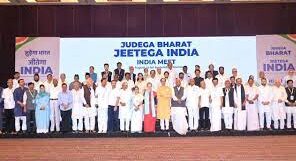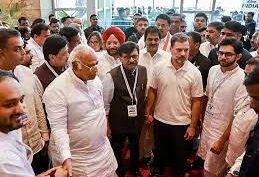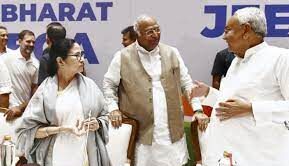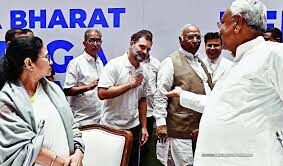Opposition alliance INDIA continues its meeting:
The Indian National Developmental Alliance (INDIA) continues its meeting in Mumbai, with the second day of discussions on September 1st, 2023. The alliance, comprised of 28 political parties, aims to unite against the ruling BJP and create a common program to address the nation’s challenges. As the alliance strives for unity, seat sharing, and regional committees take center stage in their strategy.

Unity and Sovereignty:
Prominent leaders, including Lalu Prasad Yadav and Tejashwi Yadav from the RJD, emphasize the importance of maintaining the country’s unity and sovereignty. They criticize the Modi government’s handling of issues such as poverty, unemployment, and farmer welfare, highlighting their commitment to creating a common program.
Legacy of Past Leaders: Mehbooba Mufti reflects on the contributions of leaders like Jawaharlal Nehru and Manmohan Singh, who shaped the nation’s direction and established institutions such as JNU, IIM, and ISRO.
BJP’s Concerns:
Raghav Chadha of the AAP suggests that the BJP fears the opposition alliance, particularly its association with the term “India.” He implies that the BJP may view the alliance as a threat to their rule.
Saving Democracy and the Constitution:
Aditya Thackeray, representing Shiv Sena’s Uddhav faction, underscores the alliance’s collective mission to safeguard the Constitution and democracy in India.

BJP’s Response:
Sitaram Yechury of the CPM notes that the BJP and Prime Minister Modi are taken aback by the positive response the INDIA alliance has garnered.
Challenges Posed by Modi Government:
Supriya Sule from the NCP, Sharad Pawar faction, acknowledges the challenges posed by the Modi government’s policies, leading to increased inflation and unemployment. She highlights the BJP’s discomfort with the alliance’s name as a sign of their effectiveness.
Parties in the INDIA Coalition:
The INDIA coalition comprises a diverse array of parties, including Congress, TMC, DMK, AAP, JDU, RJD, JMM, NCP (Sharad faction), Shiv Sena (Uddhav faction), SP, NC, PDP, CPM, CPI, RLD, MDMK, KMDK, VCK, RSP, CPI-ML (Liberation), Forward Bloc, IUML, Kerala Congress (Joseph), Kerala Congress (Mani), Apna Dal (Camerawadi), and MMK.
Key Meeting Agendas:

Seat Sharing and Coordination Committee:
The third meeting in Mumbai focuses on discussing seat sharing among the alliance members. An 11-member coordination committee will be formed, comprising representatives from Congress, TMC, DMK, AAP, JDU, RJD, Shiv Sena (UBT), NCP, Jharkhand Mukti Morcha, Samajwadi Party, and CPI(M).
Joint Secretariat for Protests and Rallies:
To prepare for the 2024 Lok Sabha elections, there is the possibility of establishing a joint secretariat to facilitate better coordination among the opposition parties for organizing protests and rallies.
Resolving Regional Differences:

The meeting aims to address mutual differences between parties in states where they directly compete. Examples include Congress and Left in Kerala, Left and TMC in West Bengal, AAP and Congress in Punjab and Delhi, Samajwadi Party and Congress in Uttar Pradesh, and PDP and National Conference in Jammu and Kashmir.
SC-ST and OBC in Indian Politics:
The political significance of SC-ST (Scheduled Castes and Scheduled Tribes) and OBC (Other Backward Classes) communities in India cannot be underestimated. They play a vital role in shaping the political landscape for several reasons.
Demographic Strength:
In states like Madhya Pradesh, Uttar Pradesh, Rajasthan, Chhattisgarh, Bihar, West Bengal, Tamil Nadu, Maharashtra, Kerala, and Jharkhand, the combined SC-ST population is approximately 26.8%, while OBCs constitute about 42%. These states often have Indian parties either in government or as strong opposition forces.
Integration Efforts:

Parties in these states actively work on integrating SC-ST communities into their fold to secure their support and votes.
Changing Leadership Dynamics:
Mayawati, once a prominent face of Dalit politics, has seen a decline in her support base. Parties like Congress are trying to capitalize on this shift. For example, Congress is projecting leaders like Mallikarjun Kharge, a Dalit, in Karnataka to regain the core Dalit vote.
Caste Census Debate:
The Congress supports a caste census, which is essential for understanding and addressing the specific needs of different communities. In contrast, the BJP faces challenges and controversies regarding the caste survey in Bihar.
Conclusion:
As the INDIA alliance convenes in Mumbai, its leaders focus on unity, seat sharing, and strategic planning to counter the ruling BJP in the upcoming 2024 Lok Sabha elections. The role of SC-ST and OBC communities in Indian politics remains pivotal, and parties are actively working to harness their support to secure victory. The outcome of this alliance’s efforts will undoubtedly shape India’s political landscape in the coming years.
Image Courtesy: Google
For more related news – https://universenews.co.in/congress-kharge-unveils-new-39-member-cwc/
